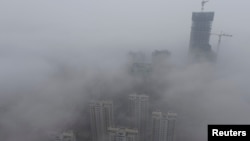China's capital city, Beijing, will enforce the use of cleaner low-sulfur coal from August 1 in a bid to tackle the soaring levels of air pollution that frequently clog the country's major cities, the official Xinhua media agency said on Saturday.
Beijing will implement strict controls and targets for airborne sulfur from coal, Xinhua said, citing the Beijing Municipal Administration of Quality and Technology Supervision.
This is the first time China has enforced the use of low-sulfur coal across all industries to tackle pollution.
Air quality in cities is of increasing concern to China's stability-obsessed leaders, anxious to douse potential unrest as a more affluent urban population turns against a growth-at-all-costs economic model that has poisoned much of the country's air, water and soil.
A Xinhua editorial earlier on Saturday called for China's population to "rein in their craze" for excessive consumption to help solve the country's growing environmental issues.
Beijing has previously established an array of laws and rules to battle the environmental consequences of three decades of unchecked growth, but weak monitoring and punishment make it tough to get powerful industrial interests to comply.
China unveiled plans at the end of last year to slash coal consumption and close polluting mills, factories and smelters to cut air pollution.
Beijing has also been pushing the country's steelmakers and power plants to buy higher-quality raw materials to meet tougher pollution targets.





